Intel Z77 Motherboard Review with Ivy Bridge - ASRock, ASUS, Gigabyte, and MSI
by Ian Cutress on May 7, 2012 7:40 PM EST- Posted in
- Motherboards
- MSI
- Gigabyte
- ASRock
- Asus
- Ivy Bridge
- Z77
Power Consumption
Power consumption was tested on the system as a whole with a wall meter connected to the OCZ 1250W power supply, while in a dual 7970 GPU configuration. This power supply is Gold rated, and as I am in the UK on a 230-240 V supply, leads to ~75% efficiency > 50W, and 90%+ efficiency at 250W, which is suitable for both idle and multi-GPU loading. This method of power reading allows us to compare the power management of the UEFI and the board to supply components with power under load, and includes typical PSU losses due to efficiency. These are the real world values that consumers may expect from a typical system (minus the monitor) using this motherboard.
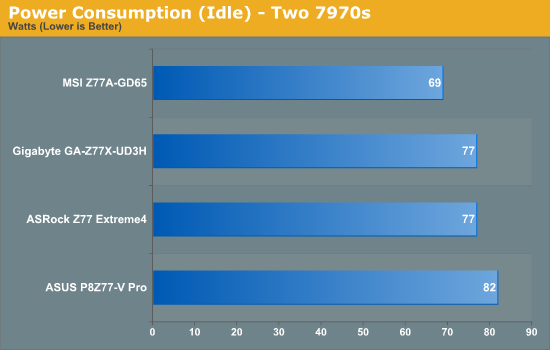
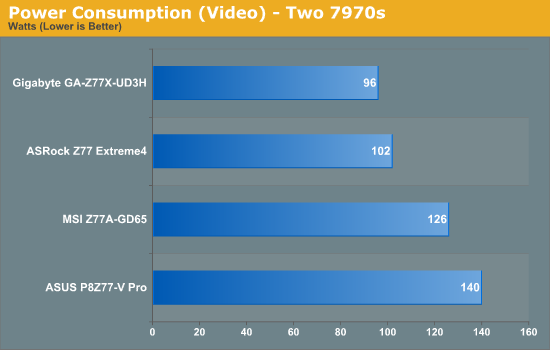
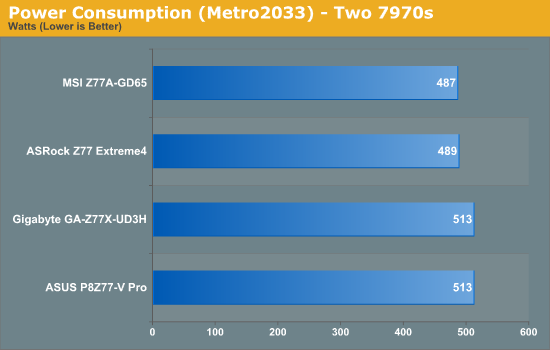
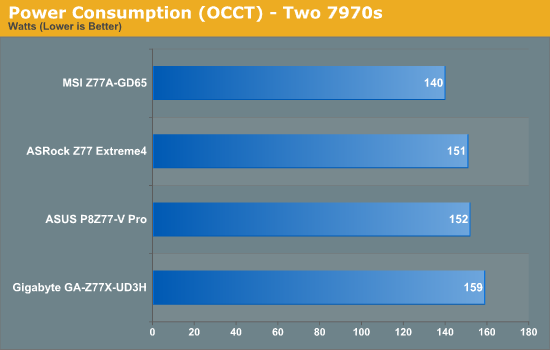
Perhaps the alarming graph of these is the power draw under video performance. It seems that certain motherboard BIOSes consider it a more intensive task, waking up more of the processor (or GPU) to compensate. At load however, we see the MSI and the ASRock boards drawing less power overall.
Boot Times
Different motherboards have different POST sequences before an operating system is initialized. A lot of this is dependent on the board itself, and POST boot time is determined by the controllers on board (and the sequence of how those extras are organized). As part of our testing, we are now going to look at the POST Boot Time - this is the time from pressing the ON button on the computer to when Windows starts loading. (We discount Windows loading as it is highly variable given Windows specific features.) These results are subject to human error, so please allow +/- 1 second in these results.
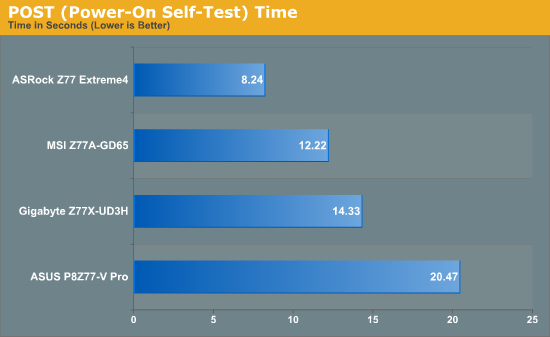
With a lot more controllers to initialise on board, the ASUS P8Z77-V Pro requires at default 20.47 seconds to reach the windows loading screen. By disabling controllers that aren't used, a time more like the ASRock could be achieved. There is direct correlation between functionality and POST time.
Overclocking
Here at AnandTech we want to provide quick and easy ways to determine if a board is good for you (with in-depth analysis of course). So here is a quick round up of our overclocking results. Overclocks are tested for stability with PovRay and OCCT - while these may not be the most strenuous of stability tests, it does offer a quick check for memory errors under high load (and also balances testing time with getting the next board on for review!).
|
CPU Speed (MHz) |
Voltage (Volts) |
PovRay Peak Temp (ºC) |
OCCT Peak Temp (ºC) |
Notes | |
|
ASRock Z77 Extreme4 |
4700 | 1.175 | 86 | 86 | LLC Level 1 |
|
ASUS P8Z77-V Pro |
4700 | 1.200 | 83 | 86 | PLL Overvoltage enabled |
|
Gigabyte Z77X-UD3H |
4700 | 1.200 | 82 | 86 | LLC Extreme |
|
MSI Z77A-GD65 |
4700 | 1.250 | 90 | - | PLL Overvoltage enabled |










117 Comments
View All Comments
Paapaa125 - Tuesday, May 8, 2012 - link
Article: "With a lot more controllers to initialise on board, the ASUS P8Z77-V Pro requires at default 20.47 seconds to reach the windows loading screen. By disabling controllers that aren't used, a time more like the ASRock could be achieved."Did you actually test this?
And a suggestion: please test Intel DZ77BH-55K motherboard. It is the only board besides MSI to use the better ACL898 and Intel LAN chip but without other useless bulk (like secondary LAN etc). It seems to have superior BIOS to many others.
IanCutress - Tuesday, May 8, 2012 - link
Hi Paapaa125,I should have an Intel Z77 board inbound to test. I have about 5 others to test as well, and some ITX. Currently reviewing boards in my spare time, so please bear with me as I get through them all! :)
Ian
Paapaa125 - Wednesday, May 9, 2012 - link
Great to hear that! And no need to rush, I can wait :) I hope you test these things:Boot time. Fan control settings. Power consumption. Lan speed/CPU util. Audio quality. And check if the Turbo Boost settings actually are identical. Otherwise the benchmark results are unbiased.
I'm actually more interested in other features than pure computational speed and benchmark scores. The differences are usually insignificant, but the differences in other areas might be big.
althaz - Wednesday, May 9, 2012 - link
Somebody further down the thread posted a message that they configured their Asus 'board to POST much quicker than above.I second request for Intel board reviews! I am particularly interested in the DZ77GA70K as well as the 55K mentioned by Paapaa125. I've been hearing good things about the GA70K but I'm hesitant to commit without finding out about POST times and I'd also like to see if performance is the same between the 55K and 70K.
Shadowmaster625 - Tuesday, May 8, 2012 - link
Can you give us realistic power supply measurements? I am interested in building a fairly fast system that is pretty much always on. So the idle power needs to be as low as possible. I would use a smaller power supply that is at least 85% efficient @ 50 Watts. And no video card. With just one SSD and one optical drive. My best napkin-guess would be an idle power of 40-45 watts.Silenus - Tuesday, May 8, 2012 - link
That's a fair guess for idle. The problem you will have is that ideally you will want a high efficiency supply that at idle is at least 20% loaded. For you 40-45 idle that means you would need a supply probably not more than 200 watts. It is hard to find a 80+ supply at those lower powers. You might consider a small form factor supply. This is just about fits your requirement:http://www.neweggbusiness.com/Product/Product.aspx...
Shadowmaster625 - Tuesday, May 8, 2012 - link
That might be a good choice. I wonder if I would still be able to hit 4.3GHz with that supply. I would definitely keep it at stock volts.haakon_k - Tuesday, May 8, 2012 - link
..or try the 80+ gold alternative from seasonic, if you can find a shop that sells it, 300 or 350W - optionally modular.http://www.seasonic.com/product/pc_tfx.jsp
Unfortunately without any PCIe 6 pin power connector, if you so should get tempted...
Avalon - Tuesday, May 8, 2012 - link
Well that review went as expected. MSI underperformed, Asus was needlessly expensive, Gigabyte had memory issues, and Asrock OC'd with lower voltages. That;s mirrored my experiences in the past few years.goldie.lin - Tuesday, May 8, 2012 - link
Thanks for the nice benchmarks, USB, SATA, LAN, Power Consumption, ...Especially, I appreciate the "DPC Latency" and "Boot Times" tests.
It very useful and practical!!!
Keep working, AnandTech.